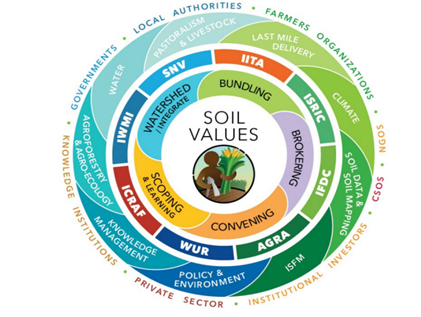Mainstreaming soil health to enhance agricultural productivity in West Africa
Soil is the bedrock for cultivation of crops, raising livestock and providing ecosystems services that enhance the resilience of the system to safeguard livelihoods. However, the importance of soils as our lifeline goes unnoticed under our feet and is neglected. Yet, healthy soils store the largest amounts of fresh water, nutrients, and carbon of all biomes, with plant-microbe interactions facilitating the uptake of water and nutrients for plant growth. The linkage of this fundamental life function of soils with global themes like climate change, water and food security, and life on land and sea go unnoticed, with little priority trickling down to the sustainable management of soils.
Policymakers, private sector actors, and other stakeholders responsible for creating viable conditions for sustainable soil management have been unable to develop mechanisms that result in the appropriate soil valuation. Such mechanisms are needed to contribute to climate adaptation and landscape restoration. These mechanisms are also necessary to produce more with less: doubling or even tripling food production with the same or less land, water, and other natural resources and making more efficient use of external inputs, such as mineral fertilizers.
Soil Values Program
The Directorate-General for International Cooperation (DGIS) of the Ministry of Foreign Affairs, Netherlands, invests in the development of mechanisms for the sustainable management of soils, through its Soil Fertility Grant Program. IFDC and partners (figure 1)) have been given the responsibility to address these soil fertility constraints and to achieve sustainable management of soil fertility in a way that contributes to ecologically sustainable improvements in food productivity and to increased resilience of small-scale food producers (arable and/or livestock farmers) in the Sahel. The program of 100 million Euros with a duration of 10 years , is coined Soil Values and started on 1 January 2024. It will improve the soil fertility and productive capacity of 2 million hectares of farmland in the Sahel as well as the resilience and well-being of 1.5 million small-scale food producers, particularly women and youth.
'Soil Values' will improve the soil fertility and productive capacity of 2 million hectares of farmland in the Sahel as well as the resilience and well-being of 1.5 million small-scale food producers, particularly women and youth.
How Soil Values Works
First and foremost, Soil Values will not be a stand-alone program dropped as an alien activity in its implementation countries Mali, Burkina Faso, Niger and Northern Nigeria, and its strategic corridor countries Ghana and Côte d’Ivoire. Rather the program will leverage its activities with institutional investments in agriculture to reach impact at scale. It will assist the World Bank’s programs FSRP (Food Systems and Resilience Program) and the ACReSAL (Agro-Climatic Resilience in Semi-Arid landscapes) in their implementation, as well as other national and regional agricultural programs. Soil Values’ partners will further build on their own programs lessons and capacity to capacitate local actors and institutions to mainstream soil fertility management in their activities. The program’s activities, undertaken in collaboration with local institutions, will provide tailor-made solutions to farm households and herders and supersede the farm level by assisting in participatory watershed / landscape planning and implementation. This will drive integrated soil fertility management (ISFM) and soil and water conservation (SWC) practices to fit landscape elements and demands by the communities. Soil Values will further broker additional financial commitments, including the involvement of the private sector to drive business around soil fertility improvement for food and nutrition security.

Soil Values understands that it should not invent the wheel all over again and will learn and adapt its activities – also to evade conflict zones – and will explore the world for solutions that could be adapted to the West African conditions. To ensure mainstreaming of sustainable soil health management for food security, it will convene high level policy and businesses on the African continent to align their activities around soils. Promising policy initiatives are for instance the recent Lomé declaration on fertilizers and soil health in West Africa and the Sahel (May 2023) aiming at developing financing mechanisms to address the current fertilizer crisis and declining soil health, and the projected 2024 African Union Fertilizer and Soil Health Summit with a roadmap and action plan for 10 years. Soil Values’ objectives fit seamlessly in these ambitions and will support nations to develop their specific roadmaps and implement their activities.
Additional information can be found on https://ifdc.org/projects/soil-values/. The launch of Soil Values is planned on 16 April 2024 in Abuja, Nigeria.
This report was prepared by Prem Bindraban and Bidjokazo Fofana.
Contact us:
Landbouwteam Ghana and Nigeria
E-mail: acc-lnv@minbuza.nl
Twitter: @Agri_WestAfrica